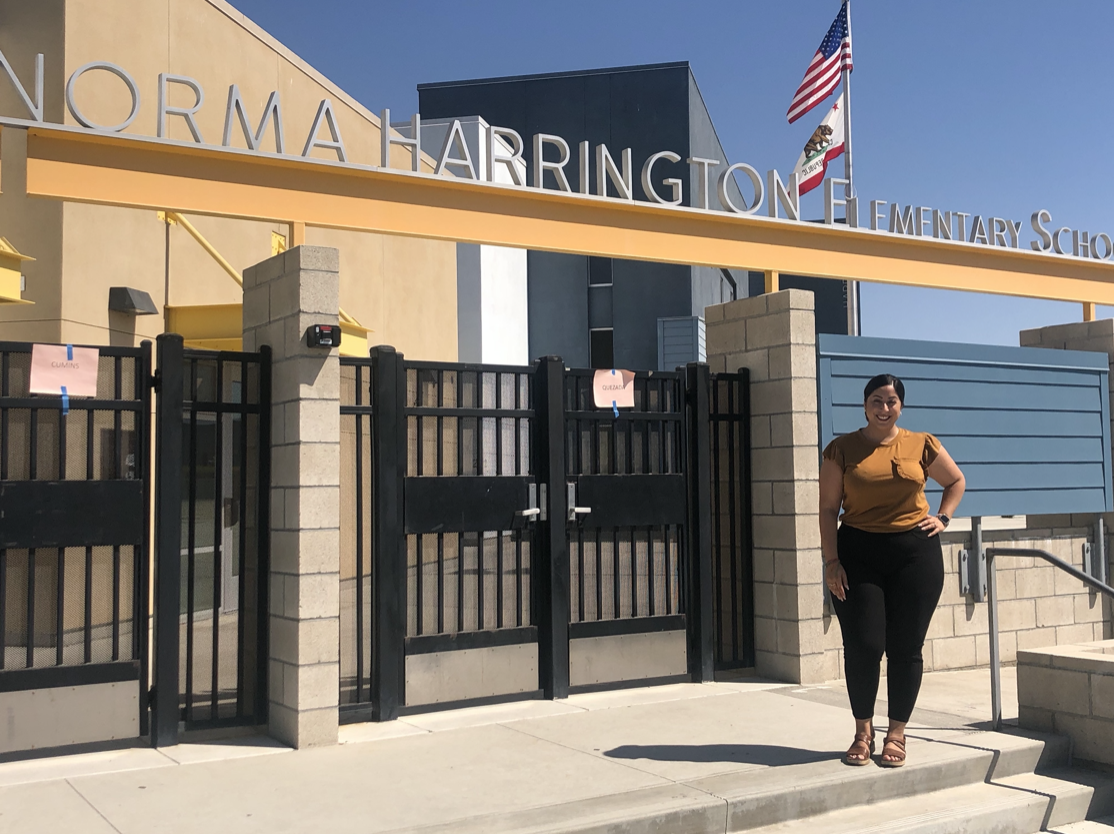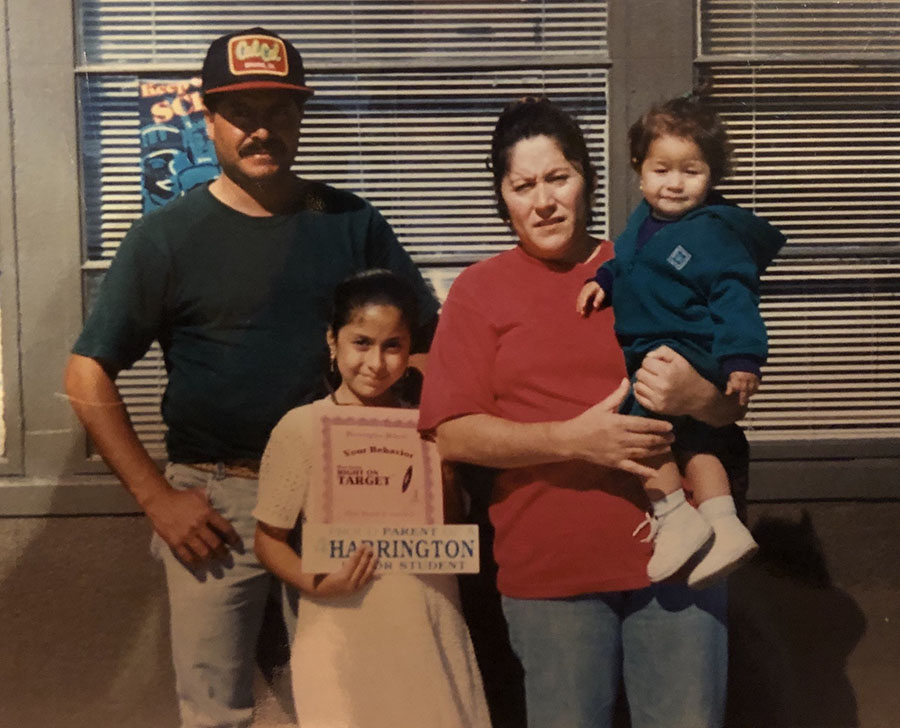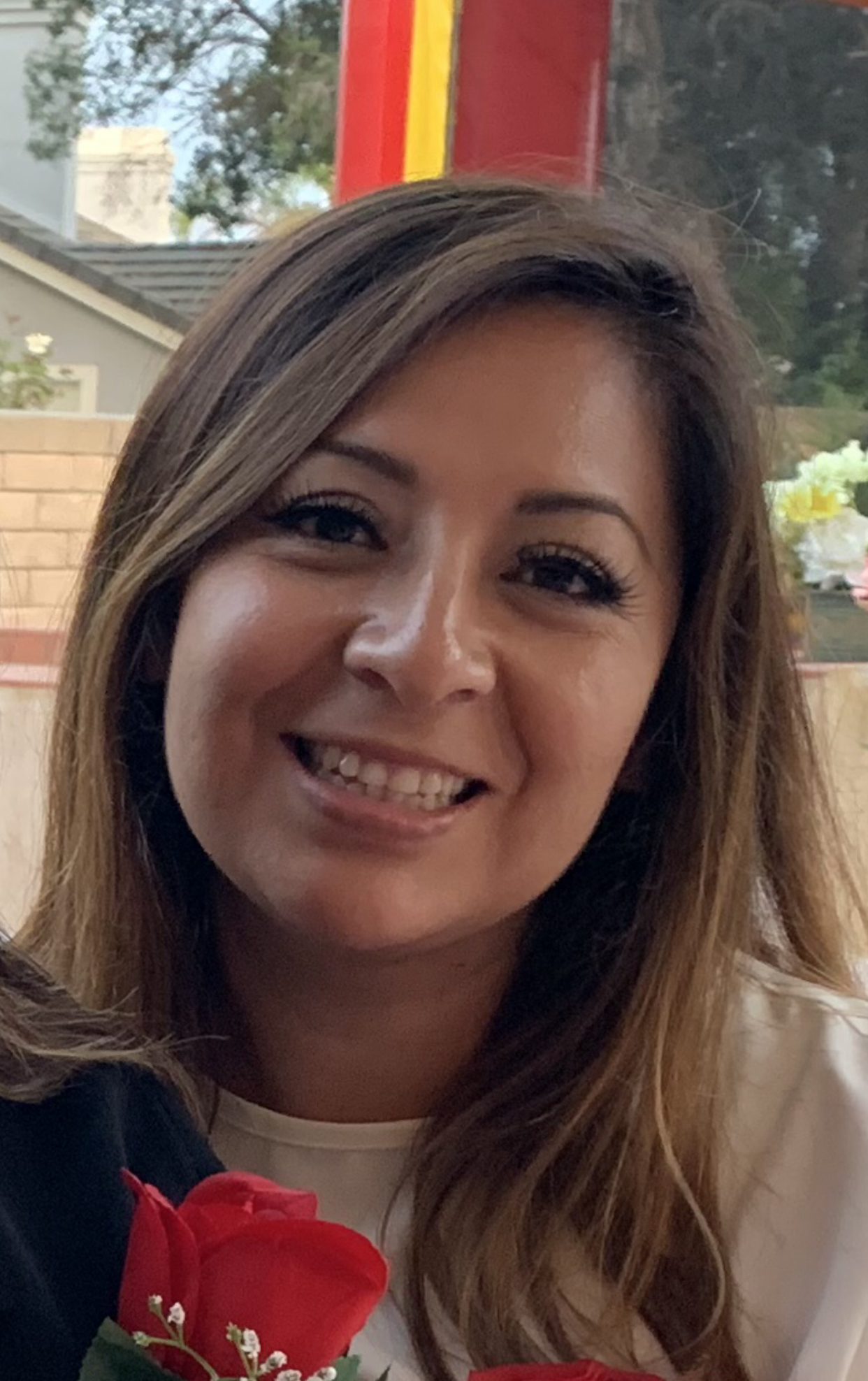CAMARILLO — Now that CSU Channel Islands (CSUCI) Teaching Credential candidate Marina Luque is student teaching at her elementary school alma mater—Norma Harrington Elementary School—Luque’s former first grade teacher, Patricia Oropeza, has asked Luque to call her “Pat.”
“But I still call her Miss Oropeza,” Luque said. “I’m 33, I’m a mom, but I call her Miss Oropeza. And sometimes I walk through the halls and think ‘No running in the halls!’”
Ayde Almaraz, 44, is spending her residency in a bilingual classroom at Rio Real Elementary in the Rio School District. Her childhood was difficult, and, having immigrated from Mexico, she knows what it’s like not to speak English, and to struggle with basic needs. She wants to help other children who may be having the same experience.
“If a student doesn’t want to do anything, they probably haven’t had enough sleep, or they haven’t eaten,” Almaraz said. “I want to be there for them to assist them with their needs.”
Luque and Almaraz are the kind of homegrown teachers the CSUCI Teacher Residency Program and area school districts like to cultivate: teachers who have grown up in the area, understand the community and are likely to stay.
“I don’t see myself teaching anywhere else but the community where I grew up,” Luque said. “Not just because I’m from this area, but I have a connection with these families and with multi-generational homes. My parents were farmworkers and that’s still what you see in this area.”
 The residency program that is helping to support student teachers like Luque and Almaraz just received a $1.4 million Residency Expansion Grant administered through the Oxnard School District that will provide $360,000 a year for four years, enough to support 15 additional students each year with a $24,000 stipend to help with tuition, fees, books and living costs.
The residency program that is helping to support student teachers like Luque and Almaraz just received a $1.4 million Residency Expansion Grant administered through the Oxnard School District that will provide $360,000 a year for four years, enough to support 15 additional students each year with a $24,000 stipend to help with tuition, fees, books and living costs.
Thirty or more CSUCI student teachers are already funded each year by the ongoing Teacher Residency program. The 15 students funded by this grant will be embedded in classrooms in the Oxnard School District, Rio School District or Santa Paula School District, which were all involved in helping procure the grant, along with the Ventura County Office of Education.
 “The teaching credential students are in the classroom from the very beginning to the very end of a school year,” explained Program Chair and Associate Professor of Education Kara Naidoo, Ph.D. “They are treated as a teacher in the district. Part of the residency is they agree to teach in the county afterward. It’s a win-win for teacher candidates and the districts because with this financial support they are able to concentrate this year on becoming the best teacher possible.”
“The teaching credential students are in the classroom from the very beginning to the very end of a school year,” explained Program Chair and Associate Professor of Education Kara Naidoo, Ph.D. “They are treated as a teacher in the district. Part of the residency is they agree to teach in the county afterward. It’s a win-win for teacher candidates and the districts because with this financial support they are able to concentrate this year on becoming the best teacher possible.”
This grant also enabled the CSUCI School of Education to add: a Transitional Kindergarten (TK) credential, a foundation-level Math or Science credential; and a Dual Credential in Special Education plus Multiple Subjects. All 15 students are pursuing one or two of those credentials.
“We have increased the content method courses which shows them how to tailor the curriculum to all learners, especially individual education plans,” Naidoo said “There is almost no classroom in the country that doesn’t include a child who wouldn’t benefit from adapting lessons to meet the needs of all learners.”
The concept of Special Education students being separate from other students is outdated, yet still common practice, according to Professor of Education Michelle Dean, Ph.D. and Associate Professor of Education Talya Drescher, Ph.D., who designed the Special Education/Multiple Subject dual credential program.
“There are a lot of stereotypes about what Special Ed is and is not and there’s a lot of fear around that,” Drescher said. “Many don’t realize that Special Education standards are divided between mild to moderate support needs and moderate to severe support needs. This credential supports kids who benefit from mild to moderate support.”
General education (multiple subject) teachers generally don’t learn how to educate children with special needs, although 14 % of all students educated in public schools receive special education services and of those, 80% spend more of the school day in general education classes, Dean and Drescher explained.
“A common misconception is students with disabilities do not have average or above average IQ and cannot succeed,” Dean said. “The reality is the majority of students with disabilities have average or above average IQs. This is just a matter of everyone rolling up their sleeves, getting all hands on deck, and learning to adapt instructional activities so all students get access.”
The third credential program, Transitional Kindergarten (TK), was pioneered in California, and is for kids whose birthdates make them too old for preschool, but not quite old enough for kindergarten. The chair of the CSUCI Early Childhood Development program, Mari Riojas-Cortez, Ph.D., was very involved with conceptualizing the Transitional Kindergarten program.
Luque is seeking a dual credential in Special Education and Multiple Subject plus a Bilingual authorization. Almaraz is seeking a Multiple Subject credential with Bilingual authorization.
After the residency, the newly minted teachers agree to teach somewhere in Ventura County, which is exactly what both plan to do. Also both mothers, they want to be role models for their children.
Right after Almaraz walked across the stage to accept her degree in Spanish and Liberal Studies from CSUCI on May 15, 2010, she went to the hospital and gave birth to her daughter, born on May 16, 2010.
Although the circumstances weren’t quite as dramatic, Luque said she had an epiphany after giving birth to her own daughter.
“I’m doing this for her,” she said. “I hope she gets to grow up in the same neighborhood I did, right by Harrington School. I feel like I am so close to closing this full circle.”
ABOUT CALIFORNIA STATE UNIVERSITY CHANNEL ISLANDS — California State University Channel Islands (CSUCI) is Ventura County’s only public university. It opened in 2002 as the 23rd campus in the CSU system, serving the regions of Ventura, Santa Barbara, and Los Angeles counties, as well as the entire state. CSUCI is nestled against the foothills of the Santa Monica Mountains located between Camarillo and the Oxnard Plain, midway between Santa Barbara and Los Angeles, and 25 miles north of Malibu.
With more than 7,000 students, 1,200 employees and over 22,000 alumni, CSUCI is poised to grow in size and distinction, while maintaining a uniquely student-focused learning environment in public higher education. CSUCI offers more than 90 academic degrees, teaching credentials, certificates, and professional and community programs. Connect with and learn more by visiting www.csuci.edu or CSUCI’s Social Media.
The University encourages persons with disabilities to participate in its programs, events and activities. If you anticipate needing any type of accommodation, or have questions about the physical access provided, please contact the respective area below as soon as possible, but no later than seven (7) business days prior to the event/activity:
CSUCI Students
Disability Accommodations & Support Services: accommodations@csuci.edu
CSUCI Employees
Human Resources: angela.portillo@csuci.edu
Members of the Public
Title IX & Inclusion: titleix@csuci.edu

